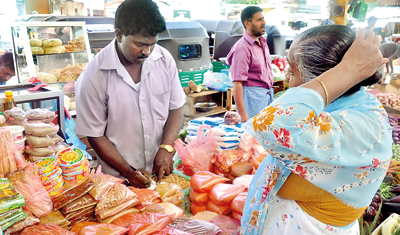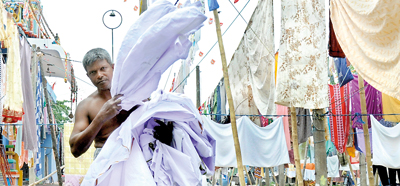News
Making ends meet is nigh impossible
The increasing cost of living is forcing consumers to purchase less than they usually do or, prioritise and do away with certain items now deemed as luxuries.These are, by and large, the reactions of consumers, observed by a team of Sunday Times reporters, during a visit to some of the main market places within Colombo city and its suburbs.

People now buy half of what they bought before. Pic by Mangala Weerasekera
There has been a series of price increases in food items such as milk foods and bread, services such as electricity and bus fares and fuel such as gas in the past six months, with the latest of them being the taxes on food items.
During the last fortnight, vegetable prices have also increased amidst government claims that the increase was due to it being ‘off season’, while vendors were of the view that it was due to the implementation of the use of plastic crates.
Priyadarshani Ariyarathna, a mother of five from Kotte, said they had been economising and gradually cutting down on expenditure, to the point of not being able to cut down further, as it would mean starving, as the present price hikes had rendered most items out of reach.
She added that she has now stopped giving milk for her children in the mornings. “We can’t afford to buy milk packets, so we have decided to give something like soup or herbal drinks in the mornings for our children,” she said.
She said that since the fuel price too went up, they’ve given up the van service and opted to travel by bus when she goes to work and her children go to school. “The cost of living is so prohibitive, that we rarely go shopping for clothes these days, and instead, spend that money on food or transportation,” she said, adding that six months before the expenses weren’t as high as they are now.
However, the increase in prices has also affected the traders as well.
A spokesman for the Old Moor St. Traders’ Association stated that the traders too were badly affected by the price hikes.
“There is less business these days, while some traders find it very difficult to ‘stay afloat’ because the taxes are very high. When we complain to the government, they ask us to increase the prices of goods, but we can’t do it, because at current prices people can’t afford a decent meal,” he said.
M. Shafikhan, a shop owner in Colombo 13 stated that the slump in business is so bad that they hardly break even most days.
“People now buy half of what they bought before. Those who bought a 250 gram milk packet, now buy a 100 gram packet, while there are people who would buy 40 grams or 50 grams of ‘loose’ milk powder. Sometimes they buy sugar for Rs. 10 or Rs. 20, for their morning or evening tea,” he said.
Mrs L. Jinadasa, an advisor of the Housewives’ Association of Colombo, stated that housewives are severely complaining about the current cost of living. “They find it very difficult to cope with their day-to-day expenses, and in our association, we try to teach our members alternate ways to find extra money for their expenses,” she said.
Selvarajan Padmi, a mother of three told the Sunday Times that they have cut down on the quantity of milk food.
“I buy a 50 gram pack of milk every morning for my children. We used to buy a bigger packet for the whole family, but now, my husband and I have given up drinking milk, simply because we can’t afford it,” she said, reflecting that in previous years, it wasn’t this bad.
“We spend around Rs. 1,000 per day, which is very difficult to come by, as my husband is the only breadwinner and a daily-wage earner,” she said.
Meanwhile, Cooperatives and Internal Trade Minister Johnston Fernando stated that vegetable prices have gone up because it is off season these days. “When it is the season, the prices of vegetables will eventually come down, and regarding other goods, the prices have increased because of the devaluation of the rupee,” he said.
He said there was no necessity for relief to the public, as the prices of goods will come down.
comments powered by Disqus


















